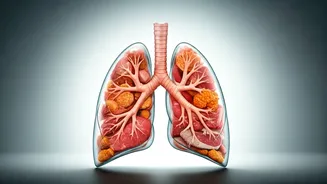Food vs. Lungs
The respiratory system, a complex network responsible for oxygen intake and carbon dioxide expulsion, can be significantly affected by diet. Certain foods
have inflammatory properties or produce irritants that compromise the delicate tissues of the lungs. The continuous exposure to these foods over time can weaken the lungs, leading to conditions that make breathing strenuous. The consequences range from mild discomfort to severe respiratory diseases. Paying attention to what we consume becomes crucial in maintaining robust lung health, because the right food choices can not only prevent damage but also boost the body's natural defenses against respiratory ailments. Therefore, by understanding which everyday foods to limit or avoid, individuals can proactively safeguard their lungs and improve their respiratory well-being.
Processed Foods Beware
Processed foods are often packed with additives, preservatives, and unhealthy fats that trigger inflammation in the body, including the lungs. These ingredients contribute to an environment where the respiratory system struggles to function effectively. Items such as refined carbohydrates, found in many snacks and packaged goods, can increase mucus production, making it harder to breathe. Also, the high salt content in processed foods can cause fluid retention, adding more stress on the respiratory system. It's essential to scrutinize food labels and limit your intake of pre-packaged meals, sugary drinks, and processed snacks. Instead, opting for whole, unprocessed foods like fruits, vegetables, and lean proteins can help reduce inflammation and support healthy lung function.
Sugary Drinks and Lungs
Sugary drinks, including sodas, fruit juices with added sugar, and energy drinks, contribute to a cascade of negative effects on lung health. High sugar intake promotes inflammation, a primary concern for respiratory function. Furthermore, excessive sugar consumption can worsen asthma symptoms and increase the risk of respiratory infections. These sugary beverages often lack essential nutrients and provide empty calories, offering no benefit for lung health. The quick absorption of sugars can lead to blood sugar spikes, which stress the body and can exacerbate respiratory issues. Swapping these drinks with water, herbal teas, or naturally flavored beverages is a simple yet impactful way to improve respiratory health and overall wellness, contributing to better lung function.
Fried Foods' Impact
Fried foods are known for their high levels of unhealthy fats, which can trigger inflammation. The cooking process often involves the use of oils that, when heated to high temperatures, release harmful compounds that irritate the lungs. These oils can generate acrolein and other substances that can damage the delicate lining of the airways. Moreover, fried foods frequently contain trans fats, which are strongly linked to chronic inflammation. The consumption of fried foods can worsen symptoms in individuals with respiratory conditions like asthma and COPD, and also increases the risk of developing lung infections. Limiting fried foods and choosing healthier cooking methods, such as baking, grilling, or steaming, will benefit lung health.
Excess Salt Issues
Excessive salt intake leads to fluid retention in the body, which can strain the respiratory system. This added fluid can accumulate in the lungs, making breathing more difficult and increasing the workload on the respiratory muscles. Sodium-rich foods, common in processed meals, are a primary source of this issue. Furthermore, high salt intake has been linked to increased inflammation, impacting the lungs' ability to function efficiently. The body’s response to excess sodium can exacerbate symptoms in individuals with respiratory ailments, intensifying the discomfort. It is crucial to monitor daily salt consumption and be mindful of hidden sources of sodium, like processed meats and pre-packaged meals. Choosing fresh, whole foods and flavoring them with herbs and spices instead of salt is a strategy for lung health.
Dairy's Potential Effects
For some individuals, dairy products can increase mucus production, which may worsen respiratory symptoms and make breathing more challenging. Certain proteins in dairy can trigger inflammation in sensitive individuals, potentially aggravating conditions like asthma. Although dairy doesn't affect everyone in the same way, individuals susceptible to respiratory issues might experience increased congestion and a feeling of heaviness in the chest after consuming dairy products. Consider limiting dairy intake or switching to dairy alternatives like almond or soy milk to observe how your body responds. This approach can help determine if dairy is affecting your respiratory health, and dietary adjustments can lead to improvements.
Alcohol and Lungs
Excessive alcohol consumption can directly impact lung health, causing inflammation and reducing the immune system's ability to defend against respiratory infections. Alcohol can disrupt the normal function of the lungs, making them more vulnerable to harm. The respiratory system's ability to clear mucus is also weakened by alcohol, increasing the risk of infections. Heavy drinking can damage the cells that line the airways, leaving the lungs more susceptible to diseases. Avoiding excessive alcohol consumption is a smart step to protect your lungs and reduce your risk of respiratory ailments. If you are a regular drinker, it is important to monitor your intake and be mindful of your overall health, to keep lungs in top condition.












